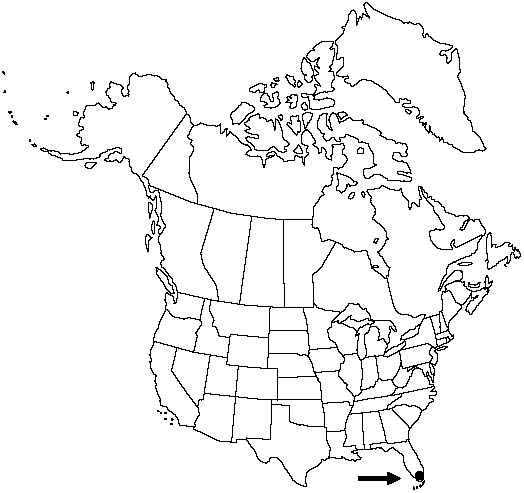Difference between revisions of "Trichomanes lineolatum"
in Hooker & Baker, Syn. Fil. 73. 1867.
FNA>Volume Importer |
imported>Volume Importer |
||
| (7 intermediate revisions by 2 users not shown) | |||
| Line 1: | Line 1: | ||
{{Treatment/ID | {{Treatment/ID | ||
|accepted_name=Trichomanes lineolatum | |accepted_name=Trichomanes lineolatum | ||
| − | |accepted_authority=(Bosch) Hooker | + | |accepted_authority=(Bosch) Hooker |
|publications={{Treatment/Publication | |publications={{Treatment/Publication | ||
| − | |title=in Hooker & Baker,Syn. Fil. | + | |title=in Hooker & Baker, Syn. Fil. |
|place=73. 1867 | |place=73. 1867 | ||
|year=1867 | |year=1867 | ||
}} | }} | ||
|common_names=Lined bristle fern | |common_names=Lined bristle fern | ||
| − | |basionyms={{Treatment/ID/ | + | |basionyms={{Treatment/ID/Basionym |
|name=Didymoglossum lineolatum | |name=Didymoglossum lineolatum | ||
|authority=Bosch | |authority=Bosch | ||
| + | |rank=species | ||
| + | |publication_title=Ned. Kruidk. Arch. | ||
| + | |publication_place=5: 136. 1863 | ||
}} | }} | ||
|synonyms= | |synonyms= | ||
| Line 20: | Line 23: | ||
}}<!-- | }}<!-- | ||
| − | --><span class="statement" id="st- | + | --><span class="statement" id="st-undefined" data-properties=""><b>Plants </b>on rock. <b>Stems</b> long-creeping, threadlike, bearing scattered leaves, covered with dark hairs of 2 types, 2-celled glandular hairs and elongate rhizoidlike hairs; roots absent. <b>Leaves</b> round to obovate, simple to irregularly lobed, 1–3 × 0.5–1.5 cm, with dark stellate hairs on margin, 2-celled glandular hairs on petioles and veins, and dark rhizoidlike hairs on petioles; petioles shorter than blades. <b>Venation</b> repeatedly forking from the base; unconnected false veins few or absent. <b>Soral</b> involucres 1–5 per leaf, terminal on blades, narrowly conic, not flaring at mouth; involucre lips with conspicuous dark marginal band 2–5 cells wide. <b>Gametophytes</b> unknown, presumed to be as others of subgenus. <b>2n</b> = 68.</span><!-- |
-->{{Treatment/Body | -->{{Treatment/Body | ||
| Line 26: | Line 29: | ||
|elevation=below 10 m | |elevation=below 10 m | ||
|distribution=Fla.;Mexico;West Indies;Central America;South America. | |distribution=Fla.;Mexico;West Indies;Central America;South America. | ||
| − | |discussion=<p>Trichomanes lineolatum leaves have unusually thick veins that are enlarged toward the margin and conspicuous in dried specimens.</p> | + | |discussion=<p><i>Trichomanes lineolatum</i> leaves have unusually thick veins that are enlarged toward the margin and conspicuous in dried specimens.</p> |
|tables= | |tables= | ||
|references= | |references= | ||
| Line 35: | Line 38: | ||
-->{{#Taxon: | -->{{#Taxon: | ||
name=Trichomanes lineolatum | name=Trichomanes lineolatum | ||
| − | + | |authority=(Bosch) Hooker | |
| − | |authority=(Bosch) Hooker | ||
|rank=species | |rank=species | ||
|parent rank=genus | |parent rank=genus | ||
| Line 46: | Line 48: | ||
|distribution=Fla.;Mexico;West Indies;Central America;South America. | |distribution=Fla.;Mexico;West Indies;Central America;South America. | ||
|reference=None | |reference=None | ||
| − | |publication title=in Hooker & Baker,Syn. Fil. | + | |publication title=in Hooker & Baker, Syn. Fil. |
|publication year=1867 | |publication year=1867 | ||
|special status= | |special status= | ||
| − | |source xml=https:// | + | |source xml=https://bitbucket.org/aafc-mbb/fna-data-curation/src/2e0870ddd59836b60bcf96646a41e87ea5a5943a/coarse_grained_fna_xml/V2/V2_254.xml |
|genus=Trichomanes | |genus=Trichomanes | ||
|species=Trichomanes lineolatum | |species=Trichomanes lineolatum | ||
| − | |||
| − | |||
| − | |||
| − | |||
| − | |||
| − | |||
| − | |||
| − | |||
| − | |||
| − | |||
| − | |||
| − | |||
| − | |||
| − | |||
| − | |||
| − | |||
| − | |||
| − | |||
| − | |||
| − | |||
| − | |||
| − | |||
| − | |||
| − | |||
| − | |||
| − | |||
| − | |||
| − | |||
| − | |||
| − | |||
}}<!-- | }}<!-- | ||
-->[[Category:Treatment]][[Category:Trichomanes]] | -->[[Category:Treatment]][[Category:Trichomanes]] | ||
Latest revision as of 21:22, 5 November 2020
Plants on rock. Stems long-creeping, threadlike, bearing scattered leaves, covered with dark hairs of 2 types, 2-celled glandular hairs and elongate rhizoidlike hairs; roots absent. Leaves round to obovate, simple to irregularly lobed, 1–3 × 0.5–1.5 cm, with dark stellate hairs on margin, 2-celled glandular hairs on petioles and veins, and dark rhizoidlike hairs on petioles; petioles shorter than blades. Venation repeatedly forking from the base; unconnected false veins few or absent. Soral involucres 1–5 per leaf, terminal on blades, narrowly conic, not flaring at mouth; involucre lips with conspicuous dark marginal band 2–5 cells wide. Gametophytes unknown, presumed to be as others of subgenus. 2n = 68.
Habitat: On rock in limestone sinks
Elevation: below 10 m
Distribution

Fla., Mexico, West Indies, Central America, South America.
Discussion
Trichomanes lineolatum leaves have unusually thick veins that are enlarged toward the margin and conspicuous in dried specimens.
Selected References
None.